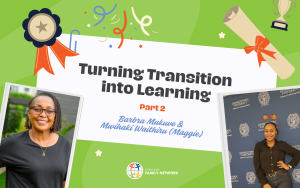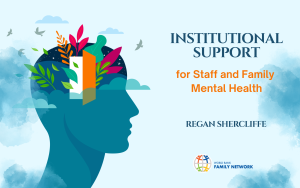This is one of two articles about WBG families dealing with a child’s developmental disability. The articles focus on the spouse’s perspective.

When Pete was two years old, Milon* and his wife sat down with the pediatrician to talk about their son’s development. They had noticed his speech was slow, and he seemed immature compared to other children his age. On the other hand, he knew and could write every letter of the alphabet, and could count to twenty. The doctor gently told them that he was seeing signs of autism and that they should get an evaluation.
Milon remembers his reaction. “At first, you cannot accept it. It was so hard to hear. My kid, autistic? I said no, it’s just a speech delay.”
A specialist at Children’s National Medical Center in Washington DC confirmed the diagnosis of autism spectrum disorder (ASD)**. “We cried all the way home. And that night we looked at him asleep, and we were thinking that he would never be normal, never be like other kids. He couldn’t even say papa or mama.”
Over a year has passed since that day, and Pete is now in a special education pre-K class at the local elementary school. He has begun to use words, and can deal with his frustrations better. He is still occasionally hyperactive and clearly anxious (anxiety is very common problem with ASD), often biting his nails right down, but in general he has adjusted well, and is progressing.
This is in large part due to a special therapy for children on the autism spectrum, known as Applied Behavioral Analysis Therapy (ABA). To make a difference, this one-on-one therapy must start as early as possible, and must be intensive. Pete receives the therapy at home for a total of nine hours. But this is not enough—ideally, he should be getting thirty-five hours per week of ABA therapy.
Thirty-five hours a week is a difficult target to reach. They have to be crowded into after-school hours when demand for therapists is highest. (Milon is hoping that soon Pete will receive additional ABA therapy during school.) Until this year it was also an impossible target financially, especially given the other necessary services for Pete, such as speech and occupational therapy. Milon noted that they reached Aetna’s limit for autism services well before the year was out, and that was without fulfilling the thirty-five hours of ABA therapy per week. (Note: The WBG has recently negotiated higher coverage with Aetna.)
There are other, indirect costs too. Milon is currently working part-time and cannot imagine how he would be able to take his son to all the therapy and medical appointments if he worked full-time. He gave up a good job in aviation in his home country to accompany his wife to Washington, but he cannot easily enter the same field in the US. Currently, he is driving with Lyft, which gives him flexibility, but which pays very little.
Life at home is centered on Pete’s needs. In addition to his special needs, he is also a typical three-year-old who is always busy and needs supervision at every waking hour. Sometimes his mother falls asleep with her son on her lap, and sometimes Milon escapes to the balcony of their apartment for a cigarette. “Self-care?” says Milon. “I don’t care about myself. I wouldn’t feel good at the gym or hanging out with friends while my family needs me. I can find small moments to take care of myself. If my kid is good, I’m good.”
When Milon picks up a difficult customer, or his son is having a bad day, he feels the stress and starts to blame himself. He tells himself that he should be earning more, and wonders if he should have pushed to have his son diagnosed even earlier. He worries about his career. He misses his family and friends and his life in his home country, to which he and his wife have only returned once in the four years they have been in DC. Money is tight. There are insurance co-pays, and multiple visits to the ER (children with ASD often have coordination issues). Pete has a special diet, activities and recommended toys and books. There is after-school care when needed. Milon dreams about the nighttime fishing he used to do in his home country. In the moonlight, “it’s as if you are in another world”.
But then Milon sees his son, who is smiley and funny, and is developing and improving. And he reminds himself that the therapeutic services in Washington are among the best in the world and that thanks to his wife’s job, they have a very good insurance plan. Pete’s autism is fortunately not severe, and one day he will be able to graduate from the intensive therapy stage.
“Autistic or not, he’s my son, and I will go far with him and for him,” Milon says with a smile. Milon’s wife feels the same way. They are devoted and committed parents who dream of the moment their son will look at them and be able to say papa and mama.
----------------------------
*To maintain privacy, names are not real.
** Autism spectrum disorder (ASD) is a developmental disorder that affects communication and behavior. For more information please visit NIH website by clicking here






